#Dennis Israel
Explore tagged Tumblr posts
Text
Not promoting Dune as a product here but the fact that in the 60s, a guy actually got a book published (after much rejection) about a middle-eastern themed planet whose natural resources are stolen and people devastated by an oppressive capitalist faction that's funded and supported by a wealthier, more widely hegemonic capitalist faction is such a triumph to me and we're seeing so much of this metaphor play out every year we're alive to this day. We need more stories that speak truth to power whether it's fiction or nonfiction.
#dune#dune film#dune part 2#dune part two#dennis villeneuve#timothee chalamet#zendaya#javier bardem#josh brolin#jason momoa#oscar isaac#rebecca ferguson#gaza#free gaza#free palestine#israel
364 notes
·
View notes
Text

Damn right the violence must stop, now MAKE SOMEONE WITH POWER LISTEN
#free gaza#free palestine#gaza strip#irish solidarity with palestine#palestine#gaza#news on gaza#al jazeera#boycott israel#israel#Trinidad and Tobago#Dennis Francis#UNGA#UN#United Nations General Assembly#New York#USA
76 notes
·
View notes
Text
by Dennis Prager
On Sept. 21, The New York Times provided a perfect example of Israel Derangement Syndrome in a column written by Michael Walzer, a professor emeritus at the Institute for Advanced Study in Princeton, New Jersey, titled "Israel's Pager Bombs Have No Place in a Just War."
As is well known, last week, pagers used by Hezbollah terrorists exploded, killing a handful of them and wounding hundreds more. Amazingly accurate, the exploding pagers killed very few noncombatants.
Hezbollah is the Shiite and Lebanese equivalent of the Gaza-based Sunni Hamas. Like Hamas, Hezbollah has one purpose: to kill as many Israelis as possible and eradicate the Jewish state. Hezbollah has fired more than 8,000 rockets into Israel in an attempt to kill as many Israeli civilians as possible. Tens of thousands of Israelis have fled their homes in northern Israel and have not returned in nearly a year.
That Israel is being attacked for killing Hezbollah terrorists is proof that, according to the vast array of Israel-haters -- the political, media and academic left, and Muslims in the Western world -- Israel is not allowed to defend itself. It should now be obvious that the current hatred of Israel is not a result of Israel's bombing of Gaza. When Israel targets Hezbollah terrorists -- and only Hezbollah terrorists -- it is equally condemned.
Which brings me to the Times column by Walzer.
Walzer writes: "The explosions on Tuesday and Wednesday were very likely war crimes -- terrorist attacks by a state that has consistently condemned terrorist attacks on its own citizens.
"Yes, the devices most probably were being used by Hezbollah operatives for military purposes. This might make them a legitimate target in the continuous cross-border battles between Israel and Hezbollah. But the attacks ... came when the operatives were not operating; they had not been mobilized and they were not militarily engaged. ... It is important for friends of Israel to say: This was not right."
According to Professor Walzer, terrorists can only be killed when they are "operating," "mobilized" or "militarily engaged." If they are not doing so, it is a "war crime" to kill them. Furthermore, the mere fact that these members of Hezbollah had those pagers -- devices the professor admits "probably were being used by Hezbollah operatives for military purposes" -- means these terrorists were "operating." That's why they had them: to plan and carry out operations against Israel.
That, dear reader, is derangement.
#hezbollah#lebanon#israel derangement syndrome#michael walzer#new york times#pager bombs#dennis prager
14 notes
·
View notes
Text
Dennis Prager COMPREHENSIVELY Rebuts Candace Owens' Antisemitism
youtube
#israel#fuck u candace#candace owens#dennis prager#antisemitism#am israel hai#jublr#judaism#ישראלבלר#ישראבלר#טאמבלר ישראלי#עם ישראל חי#ישראל#Youtube
14 notes
·
View notes
Text
Dennis Prager's Four Guidelines for Distinguishing an Israel-Hater from a Concerned Critic of Israel
1. When a person begins talking about the unfairness of Israel's creation, know that you are listening to an Israel-hater. Almost every country on earth was born in bloodshed, yet this person challenges only one's legitimacy - that of the one Jewish state.
Ask the person why he or she doesn't raise questions about Pakistan's birth. While Israel's birth was accompanied by the death of a few thousand Palestinians and Jews, Pakistan's birth resulted in the killing of about a million Muslims and Hindus. Why then does the person question only Israel's right to exist? Jews know the reason - Israel is Jewish.
2. Is the critic of Israel prepared to admit that of all the nations surrounding it, Israel is the only democracy, the only state with an independent judiciary and press, freedom of religion and, most important, its own mechanisms for self-criticism? If not, he is an Israel-hater.
3. Ask the person if he or she is as vocal about the rights of Tibetans occupied by China or blacks killed by the Sudanese government as he is about Palestinian statehood. If not, why? Jews know the reason.
4. IF the person is over fifty, ask if he or she was as vocal on behalf of a Palestinian state when the West Bank was occupied by Jordan before June 1967? If not, why all of a sudden, when Palestinians came under Israeli occupation, did the critic begin to be so concerned with Palestinian statehood? Jews know the reason, and it isn't because of the individual's newfound love of Palestine.
- Dennis Prager, "Why Anti-Zionism Is Antisemitism," Ultimate Issues, October-December 1990, page 16
17 notes
·
View notes
Photo







‹ Giro d'Italia 2023 ›
#andrea pasqualon#nico denz#marco frigo#davide ballerini#stefano oldani#alessandro verre#nicolas dalla valle#edoardo affini#lorenzo fortunato#damiano caruso#alberto dainese#larry warbasse#rohan dennis#lukas postlberger#niccolo bonifazio#bahrain victorious#bora hansgrohe#israel premier tech#soudal quick step#green project bardiani csf faizane#alpecin deceuninck#team arkea samsic#team corratec selle italia#team jumbo visma#eolo kometa#team dsm#ag2r citroen team#team jayco alula#intermarche circus wanty#cycling
72 notes
·
View notes
Text
youtube
"Season of Prayer" - Dennis Beard and The Right Siders
#Season of Prayer#Donald Trump#MAGA#Israel#Patriots#Conservatives#JESUS#Faith in JESUS#God#Sealing God's People#Dennis Beard Ministries#Youtube
2 notes
·
View notes
Text
The biggest benefactor to Hamas in the US is not the radical chic fringe but Republican former President George W. Bush.
Because of recency bias, many people have forgotten what an awful president George "Dubya" Bush was. But in addition to two recessions (including the Great Recession), two rounds of tax breaks for the filthy rich, neglecting national security which led to 9/11, and starting an unnecessary and destabilizing war in Iraq, Bush helped to bring the terrorist group Hamas to power in Gaza.
Gaza has not had an election since 2006 – one which was instigated by George W. Bush. That election turned out to be a disaster.
It was in January 2006 that the Palestinian territories held what turned out to be their last parliamentary elections. Hamas won a bare plurality of votes (44 percent to the more moderate Fatah party’s 41 percent) but, given the electoral system, a strong majority of seats (74 to 45). Neither party was keen on sharing power. Fighting broke out between the two. When a unity government was finally formed in June 2007, Hamas broke the deal, started murdering Fatah members, and, in the end, took total control of the Gaza Strip. Those who weren’t killed fled to the West Bank, and the territories have remained split ever since. In other words, Hamas’ absolute rule of Gaza is not what the Palestinians voted for back in 2006. In fact, since the median age of Gazans is 18, half of Hamas’ subjects weren’t even born when the election took place. Since they have known no alternative, have absorbed little information but Hamas propaganda, and have witnessed periodic outbursts of violent conflict with Israel throughout their lives, it is impossible to know what they really think about their rulers. But we need to ask another question: Why did the 2006 elections take place? The explanation lies in the political ideals—or, more correctly, the naïveté—of President George W. Bush. (Much of this comes from the reporting for my 2008 book, Daydream Believers: How a Few Grand Ideas Wrecked American Power.) Bush entered his second term, in January 2005, convinced that his mission was to spread democracy around the world. He assumed that democracy was the natural state of humanity: Once a dictator was toppled and the people could vote for leaders in elections, freedom and liberty would bloom forth. For a moment, it looked like he might be right: The world was witnessing the Orange Revolution in Ukraine, the Cedar Revolution in Lebanon, the first parliamentary elections in post-Saddam Iraq. More pertinent, the Palestinian National Authority held its first election, and Mahmoud Abbas’ Fatah party—which had recognized Israel’s right to exist and supported negotiations for a two-state solution—won handily. Around this time, Israel was withdrawing from the Gaza Strip—not just pulling out troops, but evicting some 8,000 Jewish settlers (most of whom were paid to resettle in the West Bank). Suddenly there was a vacuum of local authority. Bush thought democracy would fill a vacuum, so he urged the Palestinian Authority to hold parliamentary elections.
Create a power vacuum and the most determined group, not the most appropriate group, will rush in to fill the void. That happened to be Hamas.
One problem, though: Radical parties—notably Hamas and Islamic Jihad, which had boycotted the 2005 presidential election—decided to compete in the 2006 parliamentary contests. Six weeks before these elections, Dennis Ross was on one of his frequent trips to the Middle East. As the Middle East envoy for Presidents Bill Clinton and George H.W. Bush, Ross had more experience negotiating with Israelis and Palestinians than any American. He was no longer in the U.S. government, but he knew all the relevant players. Ross was leery about holding elections. He thought that if there were elections, militias such as Hamas should be banned from participating; they should have to choose between joining the system and waging violence against it—they shouldn’t be allowed to have it both ways. Members of Fatah, fearful that Hamas might win, approached Ross and asked if he could quietly urge the Israelis to block the election. An odd alignment was taking shape. “What’s wrong with this picture?” Ross asked himself. Fatah and Israel were against holding the elections; Hamas and President Bush were in favor. Ross communicated all this to Robert Zoellick, a former colleague from Bush Sr.’s days who was now deputy secretary of state. Like Ross, Zoellick worried the election could be disastrous. He urged his boss, Bush Jr.’s secretary of state, Condoleezza Rice, to urge Israelis to do some things to improve Fatah’s prospects—for instance, to ease up on border crossings in the Palestinian territories and let Abbas take credit for the gesture. Rice refused, saying that the U.S. shouldn’t put its thumb on the scales. A former hardheaded adherent of realpolitik, Rice had recently adopted Bush’s view of the world: She thought, or at least acted as if, elections were a magic potion for curing political ills and that the U.S., having delivered or blessed them, should sit back and let the historical forces flow naturally. To her (and most American observers’) surprise, Hamas won. It proved to be only the first yank in the unraveling of the Bush-Rice dogma. Civil war broke out between Hamas and Fatah, leading eventually to Fatah’s expulsion from Gaza, Hamas’ total dictatorship there, and a resumption of rocket fire from the enclave into Israel—prompting the Israeli blockade on Gaza’s northern border (which Egypt, whose leaders hated and feared Hamas as well, reinforced with a blockade on the southern border).
The bottom line...
[T]he election that put Hamas in power was not inevitable; it was premature. Israel and the leaders of the neighboring Sunni Arab nations, who inveighed lavish rhetorical support for the Palestinians but did very little to back it up, could have done more to help build the elements of a civil society and negotiate a peace. But ultimately, they didn’t want to. Elections only tightened the bonds of conflict and lent it a veneer of legitimacy. Hamas’ murderous assault on Oct. 7, the subsequent escalation of violence, and the possibility of a widening war—these are the latest and most bitter fruits of the elections’ legacy.
At best, Bush and Condoleezza Rice were foolish and naïve. They felt that elections in countries with little in the way of democratic institutions would solve all their problems.
Bush, Rice, and Vice President Dick Cheney also repeatedly fawned all over what they called the first election in Afghanistan in 5,000 years. Afghanistan, like Gaza, had no background in democracy and we know what good those elections did Afghanistan in the long run.
Fred Kaplan, the author of the Slate article which is excerpted above, recently spoke with Brian Lehrer at WNYC. You can hear their conversation here...
The U.S. Role in the Israel-Hamas War
#gaza#hamas#fatah#palestinian national authority#george w. bush#the g.w. bush administration#israel#elections#democratic institutions#republican naïveté#democracy#dennis ross
11 notes
·
View notes
Text

Released for publication: 18-year-old, Dennis Zinoviev, is the IDF soldier (Kfir Brigade) who was killed after a grenade exploded in a backpack at a military base in central Israel.
ברוך דיין האמת 💔 - @jewishbreakingnewstelegram
25 notes
·
View notes
Text
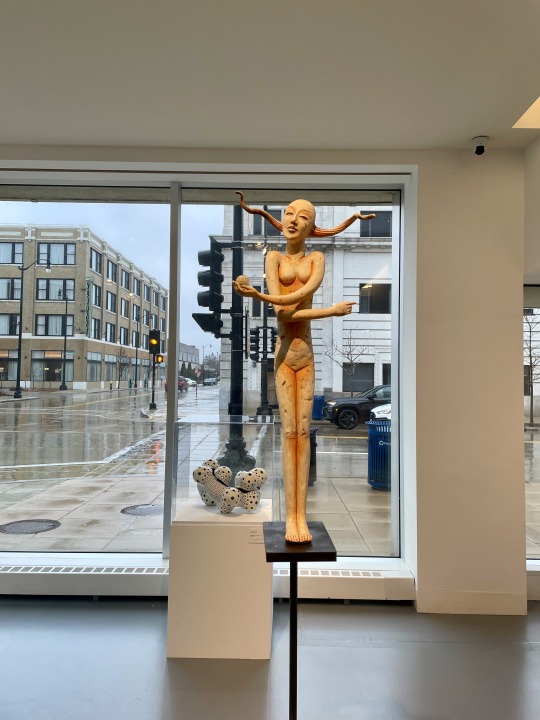


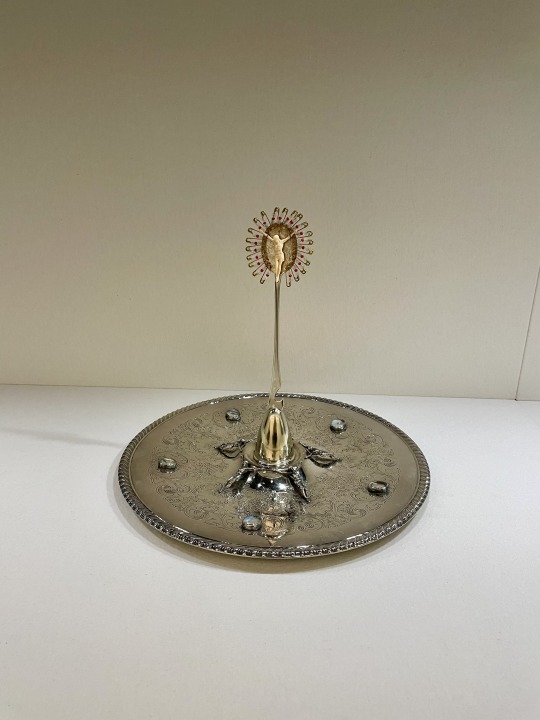



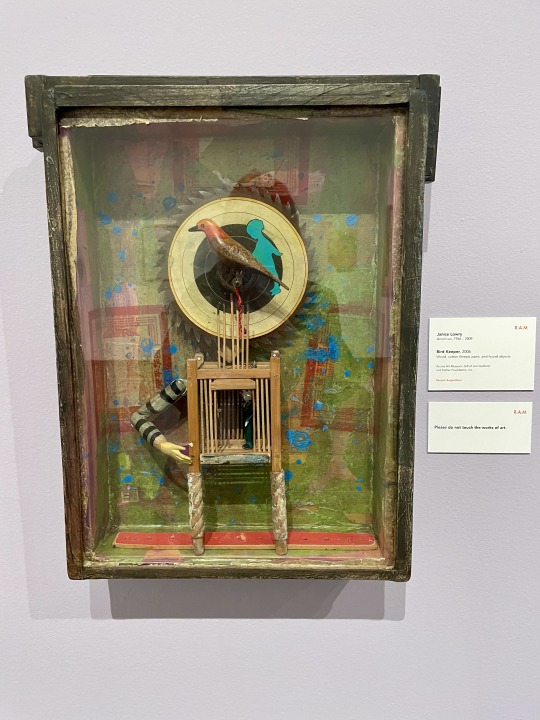
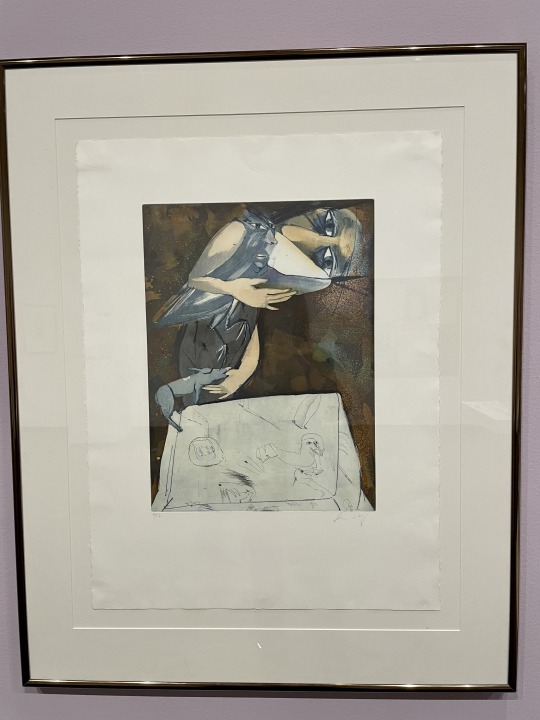
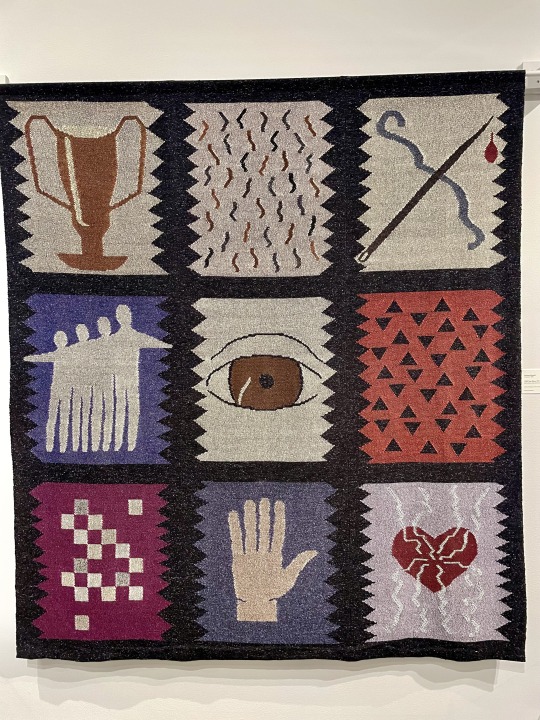
Some favorites from my most recent visit to the Racine Art Museum (March 14).
Patti Warashina: "Crossroads from the Mile Post Queen Series," 2001. Glazed stoneware on metal stand.
Louis Mendez: "Sea World Platter," ca. 1998-2005. Glazed porcelain.
Judith Hoyt: "Untitled (Head)," ca. 1985-200. Concrete on found pottery shard. "Untitled (Single Head)," 1997. Found metal, paint, and wood. "Untitled (Head)," ca. 1985-2000. Concrete on found pottery shard. "Untitled," 1993. Found metal and paint.
Robert W. Ebendorf: "Serving J.C.," 1994. Found silver plate, sterling silver, tin, plastic, brass, and found objects.
Peter Voulkos: "Untitled," 1979. Color lithograph, computer to plate.
Dennis Lee Mitchell: "Westwater," 2023. Smoke on paper.
Margaret Ponce Israel: "Enfantines," 1979. Burlap, plaster, acrylic paint, paper, linen, and dyed cotton thread.
Janice Lowry: "Bird Keeper," 2006. Wood, cotton thread, paint, and found objects.
Ann Wolff: "Anna Anme (Anna Breastfeeding)," 1987. Color aquatint and etching, edition 56/60.
Barbara Brandel: "1000 Year Diary," 1997. Dyed cotton, silk, and wool.
#art#racine#art museum#sculpture#mixed media#rust belt jessie#my photos#racine art museum#patti warashina#louis mendez#judith hoyt#robert w. ebendorf#peter voulkos#dennis lee mitchell#margaret ponce israel#janice lowry#ann wolff#barbara brandel
4 notes
·
View notes
Text

Well Dennis, maybe talk to the Americans!
#free gaza#free palestine#gaza strip#irish solidarity with palestine#palestine#gaza#news on gaza#al jazeera#boycott israel#israel#UNGA#Dennis Francis
35 notes
·
View notes
Text
by Dennis Prager
Schumer knows Hamas "seeks to eradicate the Jewish people." Few non-Jews have a clue how much the Holocaust has affected Jews -- including those born after the Holocaust and those Jews who lost no relatives in the greatest genocide in modern history. Most Jews suffer from a form of collective PTSD.
It could not be otherwise. The most culturally advanced country in the world, the most militarily powerful country in Europe, sought to murder every Jew in Europe -- including babies and the elderly. And it nearly succeeded: Two of every three European Jews were murdered. Equally significantly, "the nations" watched. So, just for the record, the Jews in Europe during World War II were also a pariah among the nations. With a few noble exceptions, the world was divided between nations that helped exterminate the Jews and nations that refused to do anything for them -- neither allowing into their countries the few who managed to escape the Nazis nor bombing any of the death camps or even just the railway tracks leading into those camps.
For 3,000 years, the fate of the Jews has nearly always been to be a pariah among the nations. This was foretold in the Hebrew Bible itself, which cites Balaam, a pagan "prophet," as saying that Israel is "a nation that shall dwell alone, not be reckoned among the nations" (Numbers 23:9). When Jews are defenseless, they are a pariah. And when Jews defend themselves, they are, according to Mr. Schumer and the elites of the world, also a pariah.
Had Mr. Schumer told the truth, he would have said this: Israel's being a pariah among the world's nations tells us much more about the world's nations than about Israel. Just as it did a mere two generations ago.
28 notes
·
View notes
Text
When did we get to inly 4 f2 seats left???? I feel like I missed half of these announcements (I was almost definitely sleeping), I do need them to hurry and fill those last 4 so I know if I'm free of Nissany or not
#f2#formula 2#it doesnt feel like there has been that mamy announcements#but apparently there has#please no nissany i cant deal with a 3rd year of him and dennis having some form of coming together at silverstone#my heart needs to be free of the stress of his on track crimes#also he drives for Israel so frankly i hope he never races again
0 notes
Text

Anthony Fineran (B 1981), Denny Israel Erik, 2023
0 notes
Text
OP deactivated, and some of the links were broken/marked unsafe by Firefox, so here's a new compilation post of Leslie Feinburg's (She/her, ze/hir) novels and essays on being transgender:
Stone Butch Blues official free source directly from Author's website:
Stone Butch Blues, backup on the webarchive:
Transgender Liberation: A movement whose time has come, on the web archive:
Transgender Warriors: Making History from Joan of Arc to Dennis Rodman, on the web archive:
Lavender and Red, PDF essay collection:
Drag King Dreams, on the web archive:
(Also, if anyone ever tells you that the protagonist of Stone Butch Blues ""ends up with a man""........ they're transmisogynistic jackass TERFs who are straight up lying)
Please also check out your local public libraries for these books and see if they carry them, to help support public libraries! If you have a library card already you can checkout Libby and Overdrive to see if your public library carries it as an ebook that you can checkout :)
EDIT: another not included on the orignal masterpost-- Trans Liberation: Beyond Pink or blue !
annnnnd in light of the web archive losing it's court case, here's a backup of both PDFs and generated epubs a friend made:
5/26/2023: hello! I am adding on yet another book of queer history, this time the autobiography of Karl Baer, a Jewish, intersex trans man who was born in 1884! Please signal boost this version, and remember to check the notes whenever this crosses your dash for any new updates :)
6/24/2023:
Two links to share!
Someone made an Epub version of Memoirs of a Man's Maiden Years, which you can find Here , as a more accessible version than a pdf of a scanned book if you're like me and need larger text size for reading--
And from another post I reblogged earlier today, I discovered the existence of "TransSisters: the Journal of Transsexual Feminism", which has 10 issues from 1993-1995, and includes multiple interviews with Leslie Feinburg and other queer feminists / activists of the 90s!
Here's a link to all 10 issues of TransSisters, plus a 1996 "look back at" by one of the writers after the journal ended, you can find all 10 issues on the Internet Archive Here !
------
8/28/2023:
"Bi Any Other Name: Bisexual People Speak Out", can be found on the web archive Here, for the 25th Anniversary Edition from 2015,
and also Here, for the original 1991 version.
Each of the above can be borrowed for one hour at a time as long as a copy is available :D
This is a living post that receives sporadic updates on the original, if you are seeing this on your dash, click Here to see the latest version of the post to make sure you're reblogging the most up to date one :)
------------
October, 25th 2023:
"I began to dawdle over breakfast during shift changes, asking both waitresses questions. After weeks of inquiries, they invited me to a demonstration, outside Kleinhan's Music Hall, protesting the Israeli war against Egypt and Syria. I was particularly interested in that protest. The state of Israel had been declared shortly before my birth. In Hebrew school I was taught "Palestine was a land without peo-ple, for a people without a land." That phrase haunted me as a child. I pictured ears with no one in them, and movies projected on screens in empty theaters. When I checked a map of that region of the Middle East in my school geography textbook, it was labeled Palestine, not Israel. Yet when I asked my grandmother who the Palestinians were, she told me there were no such people. The puzzle had been solved for me in my adolescence. I developed a strong friendship with a Lebanese teenager, who explained to me that the Palestinian people had been driven off their land by Zionist settlers, like the Native peoples in the United States. I studied and thought a great deal about all she told me. From that point on I staunchly opposed Zionist ideology and the occupation of Palestine. So I wanted to go to the protest. However, I feared the demonstration, no matter how justified, would be tainted by anti-Semitism. But I was so angered by the actions of the Israeli government and military, that I went to the event to check it out for myself. That evening, I arrived at Kleinhan's before the protest began. Cops in uniforms and plainclothes surrounded the music hall. I waited impatiently for the protesters to arrive. Suddenly, all the media swarmed down the street. I ran after them. Coming over the hill was a long column of people moving toward Kleinhan's. The woman who led the march and spoke to reporters proudly told them she was Jewish! Others held signs and banners aloft that read: "Arab Land for Arab People!" and "Smash Anti-Semitism!" Now those were two slogans I could get behind! I wanted to know who these people were and where they had been all my life! Hours later I followed the group back to their headquarters. Orange banners tacked up on the walls expressed solidarity with the Attica prisoners and the Vietnamese. One banner particularly haunted me. It read: Stop the War Against Black America, which made me realize that it wasn't just distant wars that needed opposing. Yet although I worked with two members of this organization, I felt nervous that night. These people were communists, Marxists! Yet I found it easy to get into discussions with them. I met waitresses, factory workers, secretaries, and truck drivers. And I decided they were some of the most principled people I had ever met..." Transgender Warriors (1996) Leslie Feinberg
#bold text#large text#transgender#trans#nonbinary#leslie feinberg#neopronouns#activism#no id#pride#essays#Karl bae#memoirs of a man's maiden years#bi any other name
13K notes
·
View notes